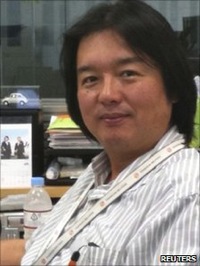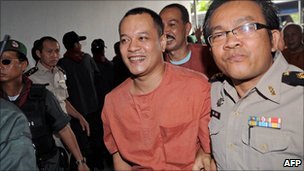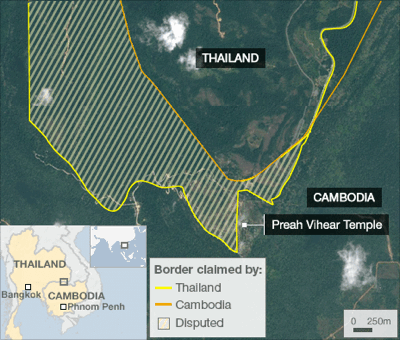
As promised, here are some quotes from Thai Prime Minister Abhisit Vejjajiva’s annual Foreign Correspondents’ Club of Thailand speech last night.
But first, a few general observations. This has been been noted many times before, but I just want to reiterate: Abhisit is quite a skillful politician. He is a highly articulate English speaker, making him well-equipped to deal with the foreign media; he stays on message; he remains calm and is not easily provoked; and he is gifted at using humor to take the sting out of difficult questions and engender sympathy with his audience.
In his speech, Abhisit seemed to focus on pocketbook issues: The country’s economy is improving, he said. His administration wants to focus on stability. And the “silent majority” of Thais feel their voices have been drowned out by noisy red shirt demonstrators.
The crowd — journalists, diplomats, members of the business community, etc. — seemed fairly receptive of the speech, and the few times he received serious needling from reporters, the crowd seemed mostly on the PM’s side.
In roughly the order that he touched on these subjects in his speech and in the subsequent Q&A, here are some snippets:
On his future:
“Maybe you’ll be wondering if I’ll be here next year. I’m wondering, too.”
On his tenure:
“The point I’d like to make tonight is that it’s time for Thailand to move forward. We’ve improved so much over the last two years during my tenure, and a few years before that we were in turbulence and (had) political challenges. But at least over the last couple of years, there has been a government focused on moving the country forward.”
On the economy:
“It’s not just about the macroeconomic numbers that you see today,” such as a move from a contraction in the economy to growth. Tourists and export numbers are improving, and “we have been able to keep fiscal and monetary stability despite the scale of the financial crisis that hit the global economy.” The debt to GDP ratio is good, and unemployment is low.
But “the Thai people still deserve more, and despite the fact that we’ve moved on from the economic crisis, Thai people face new challenges like rising prices, and the cost of living is going up.”
“We recognize that the number one problem now is to help people fight high prices.”
On education:
The government is focusing on “free basic education for 15 years, so that families are now comfortable about having their kids in school.”
Questions for voters and the timing of new election (June or July):
“Do you want to move forward with the policies that we have initiated and will build on, or do they want to stay in this cycle of conflict and violence? Do they want a government that will continue to put their interests first, or do they want people who are still tied to one person’s interests and wouldn’t allow the country and the Thai people to move beyond (it)? That’s the choice that will be facing the Thai electorate in the end of June or at the latest the end of July.”
Elections “will be an opportunity for the silent majority to be heard…for the majority of Thais, a lot of them feel their voices have been ignored” while demonstrators have been noisy.
“I hope that by the time next year’s FCCT dinner arrives, I shall be here to report further progress on delivering the people’s policies…”
On his legacy:
“I hope that these last two years…the government (will be seen as having) steered the economy through crisis, allowed the political institutions to work again since they were in paralysis…and most significantly…to create greater security and welfare for the Thai people.”
On the strengthening baht:
“We don’t have a baht problem, we have a dollar problem.” “All regional currencies have appreciated,” as well.
On his citizenship — and football:
“It was never a secret” that he is a British citizen. “I was born in Newcastle,” he said, and he is a Newcastle football supporter. He’s never had “divided loyalties” between the UK and Thailand. “The people who are questioning my nationality are not doing so because they are suspicious of my (citizenship or loyalties), they just want to take me to the ICC.”
“In fact,” he said, “I recall that the former British ambassador was very disappointed to learn that during the World Cup I supported Argentina.”
He also discussed Thailand-Myanmar relations, the Rohingya issue, and tourism in Phuket. But these passages stand out, for me, as being the most memorable.


